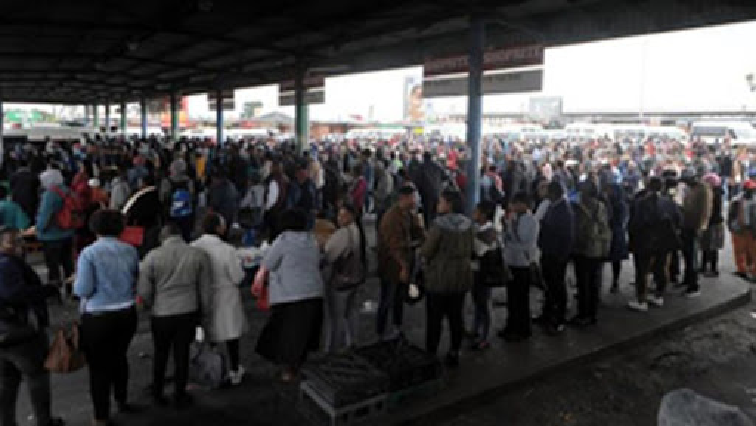Transport Minister Fikile Mbalula says this is the right time to transform the taxi industry. He has called on taxi owners to stop fighting government and instead reenter negotiations to fix the industry so that it can survive in a post-COVID world.
The minister repeated that the money offered to taxi owners, which amounts to R5 000 each, is relief and not intended to compensate them for the losses they suffered during the lockdown.
Mbalula urged taxi owners not to look a gift horse in the mouth. The minister was addressing taxi drivers in Tshwane who are participating in the countrywide strike over what they say is insufficient aid from government.
“The people today who have suffered it is us black people, who the majority of us are unemployed, who majority of us are using the very same taxis to go to work. Now, I need the taxi industry. They need me too. We can’t resolve our issues by fighting by closing the roads because Mbalula said government will give you R5 000. I can’t go beyond R5 000. We didn’t bring COVID-19 here. COVID-19 came from hell.”
Minister Mbalula visits Soshanguve amid ongoing taxi strike:
Minister Mbalula has reminded protesting taxi drivers that their industry is not the only one negatively affected by the coronavirus pandemic. He said many companies like the retail giant Edcon face massive job losses after they were forced to retrench workers due to the lockdown.
Thousands of commuters in Gauteng were left scrambling for transport as taxis halted their services.
The shutdown by the taxi association, Santaco, is an attempt to send a strong message to government to agree to their demands of R20 000 per taxi as part of COVID-19 relief funding.
“I just started a new work now. If I don’t go to work – nothing I can do. I don’t have money. I can’t walk. It’s too far. We have been affected. We knocked off late. We are being relieved by (people) from Soweto. We are security guards. People from Soweto didn’t get transport. I was offered a lift by my colleagues. I’m from Randburg. I’m also affected. I was supposed to go to work in Rosebank, and there’s nothing I can do. I don’t know what to do. I’m going back home because there are no taxis.”
Thousands of commuters are left stranded:
These taxi commuters from Alexandra, north of Johannesburg, are some of the commuters that were affected by the strike. Many are afraid they could lose their jobs.
Santaco remains optimistic that today’s shutdown will put pressure on government to accede to their demands.
Oupa Skhosana from Pretoria West has been in the taxi industry for over 20 years. His two taxis have been not generating sufficient income since the country went into lockdown.
“I cannot run the risk of running up and down, coming back and park and accumulate high mileage and repair. As I’m saying, there’s no business. That’s on the metre taxi site. On the minibus at times we park. At times, we work maybe for two or three days. (It) doesn’t work. That’s because of the loading capacity and because locally there’s no people going to work or coming back.”
Angry taxi drivers share their frustrations:
The strike was also felt by other transport businesses. The bus company, Putco, was stopped from operating on Monday morning.
In Soweto, passengers were made to disembark while on their way to work. In Pretoria, the Tshwane Bus Service was forced to suspend services after a bus with passengers was hijacked in Danville, west of the city.
Tshwane Spokesperson, Selby Bokaba, says, “The driver was hijacked with a bus full of passengers. That bus was used to blockade the road in the very same vicinity. We wish to apologize to our commuters for the inconvenience caused. This is a situation that is beyond our control. Ours is to provide a service and when the lives of our drivers are threatened and there’s a threat also to our assets our buses. We have no choice but to return the assets to the depots as well as to safeguard the lives of our drivers.”
In this video, rubber bullets were used to disperse taxi operators:
The capital city was the most affected with major routes in Olievenhoutbosch in Centurion blocked with burning tyres.
In Soshanguve, the police and the military used rubber bullets to disperse the taxi drivers who had blocked the Transfer intersection with burning tyres, preventing motorists from entering and leaving the township.
Santaco has condemned these actions.
Spokesperson, Midday Mali, says, “I want to appeal to those who are blocking the roads. This shutdown is a peaceful shutdown. Let them open those roads. We even issued the instruction as a taxi industry in Gauteng that let our cars not wake up. We expect those vehicles to be at home to be where they supposed to park. I am appealing to them that let them open those roads because we made a statement that says let our commuters look for an alternative transport,” says Mali.
While the impact of the strike was felt by many commuters, the Menlyn Taxi Association, an affiliation of the National Taxi Alliance (NTA) continued transporting commuters. The association says it will continue working until the outcome of the negotiations with government tomorrow.
The association is urging its members to exercise patience pending further announcements by government
Transport Minister Fikile Mbalula has stressed that government cannot afford to offer more money to the industry






